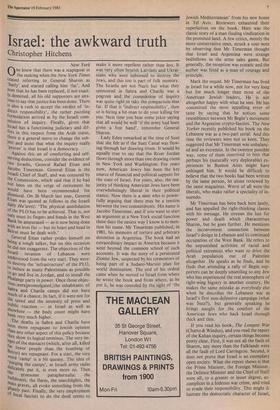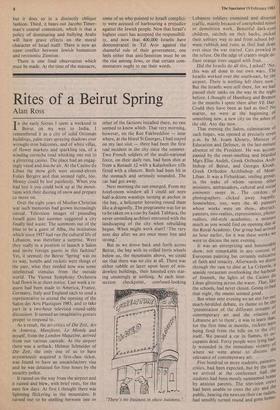Israel: the awkward truth
Christopher Hitchens
Against this set of comforting and self- serving deductions, consider the evidence of two Israelis, General Rafael Eitan and Jacob° Timerman. General Eitan is the Israeli Chief of Staff, and was censured by the Commission, which said that if he had not been on the verge of retirement he Would have been recommended for dismissal. On 26 March last year, General Egan was quoted as follows in the Israeli daily Ha 'aretz: 'The physical annihilation of the PLO has to be achieved. That is,. not Only must its fingers and hands in the West Bank be amputated — as is now being done with an iron fist — but its heart and head in Beirut must be dealt with.'
General Eitan rather prides himself on being a tough talker, but on this occasion he did not exaggerate. The objectives of the Israeli invasion of Lebanon were understood from the very start. They were: 10 destroy the 'infrastructure' of the PLO, t° Induce as many Palestinians as possible to go and live in Jordan, and to install the Phalange party in power. Once those objec- ,,tives iwerelpromulgated,Ithe inhabitants of Sabra and Chatila camps did not have nItieh of a chance. In fact, if it were not for the speed and the intensity of press and Public reaction — in Israel as well as elsewhere — the body count might have oeen very much higher. b The deaths in Sabra and Chatila have than more repugnant to Jewish opinion nail any other aspect of this policy because they show its logical terminus. The very im- ages of the massacre (which, after all, killed far fewer people than the bombing of Beirut) are repugnant. For a start, the very word 'camp' is a bit queasy. The idea of deli the camps', as Israeli army radio the ately put it, is even more so. Then , ,_" gruesome paraphernalia: the oulldozers, the flares, the searchlights, the Mass graves, all evoke something from the ghastly past. Finally, the very employment °f local fascists to do the deed seems to
make it more repellent rather than less. It was very often brutish Latvians and Ukrai- nians who were suborned to destroy the Jews, and this too is part of folk memory. The Israelis are not Nazis but what they sponsored in Sabra and Chatila was a pogrom and the commission of inquiry was quite right to take the comparison that far. If that is 'indirect responsibility', then so is hiring a hit-man to do your killing for you. Next time you hear some joker saying that all would be well `if the army had been given a free hand', remember General Sharon.
Lady Eden remarked at the time of Suez that she felt as if the Suez Canal was flow- ing through her drawing room. It would be equally true to say that the River Jordan flows through more than one drawing room in New York and Washington. For years now, American Jewry has been the key source of financial and political support for the state of Israel. For years, also, the ma- jority of thinking American Jews have been overwhelmingly liberal in their political stance. Now there is a man who is power- fully arguing that there may be a tension between the two commitments. His name is Jacobo Timerman, and if you want to start an argument at a New York social function these days the easiest way I know is to men- tion his name. Mr Timerman published, in 1981, his memoirs of torture and arbitrary detention in Argentina. The book had an extraordinary impact in America because it went beyond the common school of such accounts. It was the story of a persecuted Zionist Jew, suspected by his tormentors of being part of a Judaeo-Marxist plan for world domination. The end of his ordeal came when he moved to Israel from where he wrote the book and from where, as he put it, he was consoled by the sight of 'the Jewish Mediterranean' from his new home in Tel Aviv. Reviewers exhausted their superlatives on the book. Here was the classic story of a man finding vindication in the promised land. A few critics, mostly the more conservative ones, struck a sour note by observing that Mr Timerman thought that Israel and Argentina were strange bedfellows in the arms sales game. But generally, the reception was ecstatic and the author was feted as a man of courage and principle.
Mark the sequel. Mr Timerman has lived in Israel for a while now, not for very long but for much longer than most of the American Jewish leaders. He is not altogether happy with what he sees. He has committed the most appalling error of taste by saying that he notices some resemblance between Mr Begin's movement and the Argentine crypto-fascists. The New Yorker recently published his book on the Lebanese war as a two-part serial. And this time the reviewers were not so keen. They suggested that Mr Timerman was unbalanc- ed and an extremist. In the sweetest possible way, some of them contrived to hint that perhaps his (naturally very deplorable) ex- periences in Buenos Aires might have unhinged him. It would be difficult to believe that the two books had been written by the same person, let alone reviewed by the same magazines. Worst of all were the liberals, who make rather a speciality of in- nuendo.
Mr Timerman has been back here lately, and has appalled the right-thinking classes with his message. He stresses the lust for power and death which characterises Sharon, but he goes further. He mentions the inconvenient connection between Israel's design in Lebanon and its continued occupation of the West Bank. He refers to the unpunished activities of racial and political extremists who want to drive the Arab population out of Palestine altogether. He speaks as he finds, and he finds that attending a rally of Begin sup- porters can be deeply unsettling to any Jew who has experienced the real atmosphere of right-wing bigotry in another country. He makes the same mistake as everybody else when he describes the Lebanese war as Israel's first non-defensive campaign (what was Suez?), but generally speaking he brings naught for the comfort of the American Jews who back Israel through thick and thin.
If you read his book, The Longest War (Chatto & Windus), and you read the report of the Kahan inquiry, certain things become pretty clear. First, it was not all the fault of Sharon, any more than the Falklands were all the fault of Lord Carrington. Second, it does not prove that Israel is an exemplary open society. What the report shows is that the Prime Minister, the Foreign Minister, the Defence Minister and the Chief of Staff were all, to a greater or lesser degree, ac- complices in a hideous war crime, and tried to evade their responsibility. This might il- lustrate the democratic character of Israel,
but it does so in a distinctly oblique fashion. Third, it bears out Jacobo Timer- man's central contention, which is that a policy of dominating and bullying Arabs will have grave effects on the moral character of Israel itself. There is now an open conflict between Jewish humanism and revisionist Zionism.
There is one final observation which must be made. At the time of the massacre, some of us who pointed to Israeli complici- ty were accused of harbouring a prejudice against the Jewish people. Now that Israel's highest court has accepted the responsibili- ty, and now that 400,000 Israelis have demonstrated in Tel Aviv against the shameful role of their government, one feels either that anti-Semitism must be on the rise among Jews, or that certain com- mentators ought to eat their words.







































 Previous page
Previous page